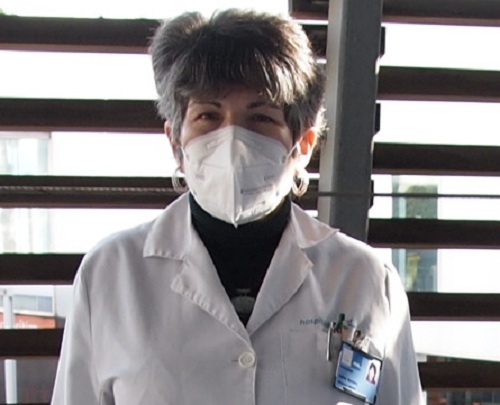
19/05/2021 - General information

The consultant in the Pneumology Department at Hospital del Mar and Hospital del Mar Medical Research Institute researcher will be at the helm of this prestigious publication for the next three years. Dr. Esther Barreiro, a consultant in the Pneumology Service at Hospital del Mar and coordinator of the IMIM's Research Group on Muscle Wasting and Cachexia in Chronic Respiratory Diseases and Lung Cancer, will be the new editor-in-chief of ERJ Open Research, the official journal of the European Respiratory Society (ERS). Her appointment was announced at the last meeting of the ERS Executive Committee and will take effect in January 2022.
04/03/2021 - Covid-19
Administering zinc supplements to covid-19 patients with low levels of this element may be a strategy to reduce mortality and recovery time. At the same time, it could help to prevent risk groups, like the elderly, from suffering the worst effects of the disease. These are the findings of a study by physicians and researchers from the Hospital del Mar, Hospital del Mar Medical Research Institute (IMIM) and Pompeu Fabra University (UPF), led by Dr. Robert Güerri, a physician at the Infectious Diseases Service of Hospital del Mar, which has just been published in the journal Nutrients. The study analysed the zinc levels of 249 adult patients treated at the centre between 9 March and 1 April 2020, with an average age of 65 years. The most common symptoms presented at the time of admission were fever, cough and dyspnea.
Més informació "Administering zinc to covid-19 patients could help towards their recovery"
18/02/2021 - Covid-19
The Hospital del Mar Medical Research Institute (IMIM), Hospital del Mar, the University of California-Davis and the University of Texas have launched a clinical trial to analyse how useful a food supplement can be for preventing the worst side effects of COVID-19. The study is looking at bovine-derived immunoglobulins, which have been shown in animal models to reduce the inflammation caused by infection, progression to more severe forms of the disease, and post-COVID syndrome. The first patients participating in the Randomized Open-Label Clinical Study Evaluating the Impact of EnteraGam, a Nutritional Intervention containing Bovine Plasma-Derived Immunoglobulin CoNcentrate, on Clinical Outcomes In People with COVID19 (PICNIC Study) are already taking two daily doses of this supplement. Dr Robert Güerri, principal investigator in the trial, member of the Infectious Pathology and Antimicrobial Research Group at the IMIM-Hospital del Mar, and section head of the Infectious Diseases Service at Hospital del Mar, explains that "The aim of the treatment is to sequester and help eliminate the virus from one of its main reservoirs in the body, the gut."
Més informació "Immunoglobulin clinical trial launched to prevent COVID-19 side effects"
15/12/2020 - Press release
DNA damage levels and the activity of the polymerase enzyme responsible for cell repair (PARP) increase in lung tumours in patients suffering chronic obstructive pulmonary disease (COPD), but not in people who do not have this pathology. This is reflected in work by researchers from the CIBER of Respiratory Diseases (CIBERES) and doctors and researchers from the Hospital del Mar Pneumology Service and the Hospital del Mar Medical Research Institute research group on muscle wasting and cachexia in chronic respiratory diseases and lung cancer (IMIM-Hospital del Mar), published in the journal Cancers This research is of enormous importance given that treating lung cancer with PARP enzyme inhibitors (already in clinical use for other tumours, such as breast and ovarian cancers) is preferentially indicated for patients with an underlying respiratory disease, while the response in people with no COPD is highly controversial.
Més informació "The presence of COPD, a determining factor in lung cancer treatment"
18/12/2020 - Press release
The journal Neurology has just published the most complete and exhaustive study to date on the survival rate and sequelae of patients who suffer a ruptured brain aneurysm, a disease known as subarachnoid haemorrhage. The work was carried out by doctors at Hospital del Mar (from the Neurology, Neurosurgery, Intensive Medicine, Interventional Neuroradiology, Radiology and Anaesthesia and Resuscitation services) and researchers from the Hospital del Mar Medical Research Institute (IMIM). The results show that the strategy implemented in Catalonia to cover emergency care for this condition produces results comparable to those of the most advanced centres in the world. The data analysed corresponds to 311 patients with aneurysmal subarachnoid haemorrhage treated at Hospital del Mar over the last 12 years. The short-term mortality rate is between 8.7% (one week after treatment, during the hospitalisation period), and 18.4% (after three months). One year after the vascular event, this figure reaches 22.9% and, five years later, 29%. Only 7% of the patients who survived after five years presented disabling sequelae. According to several studies, deaths from this pathology around the world are between 11% and 27.5% in hospital and over 30% after three months.
Més informació "Only 7% of patients treated for a brain aneurysm suffer long-term sequelae"
17/11/2020 - Press release

Nutritional parameters such as body mass index and tests including albumin and total protein levels quantified prior to lung cancer surgery in patients with chronic obstructive pulmonary disease (COPD) predict their 10 year survival, regardless of tumour-related factors and/or chest surgery. This is reflected in the work of researchers from the CIBER of Respiratory Diseases (CIBERES) and doctors and researchers from the Hospital del Mar Pneumology Service and the Hospital del Mar Medical Research Institute research group on muscle wasting and cachexia in chronic respiratory diseases and lung cancer (IMIM-Hospital del Mar), published in the journal of the Spanish Society of Pneumology and Thoracic Surgery (SEPAR) Archivos de Bronconeumología. The researchers studied the nutritional status of lung cancer and COPD patients who required surgery and the relationship of this with post-operative survival. To do this, they analysed the nutritional status of 125 patients from Hospital del Mar, 87 of whom had COPD and lung cancer and 38 of whom had cancer but no COPD, before they underwent chest surgery. The patients were monitored for 10 years in order to study their differential survival rates according to the presence or absence of COPD.
03/11/2020 - Covid-19
Some of the principal treatments for osteoporosis, denosumab, zoledronate and calcium, could have a protective effect against COVID-19 in patients who take them, specifically a 30 to 40% reduction in the rate of infection, according to the results of a joint study by Hospital del Mar, the Hospital del Mar Medical Research Institute (IMIM), Pompeu Fabra University and the Pere Virgili Health Park. The study, the first of its kind in the world, has just been published the journal Aging. The last author of the study, Dr. Jordi Monfort, head of Rheumatology at Hospital del Mar and coordinator of the Cell Research on Inflammation and Cartilage research group at Hospital del Mar-IMIM, explains that "there are indications to allow hypothesizing that certain drugs used to treat rheumatic diseases could interfere positively in the natural history of COVID-19, either by decreasing its incidence or by decreasing its progression to more serious cases". The study analysed data from more than 2,000 patients with osteoporosis, osteoarthritis and fibromyalgia and their relationship with COVID-19 infection who are being followed up at Hospital del Mar and in the Mar Health Park healthcare sphere of influence.
15/10/2020 - Press release
They believe that the treatment currently used in many cases, based solely on short-acting bronchodilators like the well-known Ventolin, may increase the risk of severe asthma attacks. This is revealed by a study published in the journal Archivos de Bronconeumología. They advocate the use of inhaled corticoids, which is also the treatment recommended by the international Global Initiative for Asthma (GINA). Asthma is increasingly prevalent and affects 5-10% of the general population. Unfortunately, the decline in associated mortality has slowed in recent years. In the current context, characterised by the COVID-19 epidemic, there is no evidence that suffering asthma implies a more severe form of COVID-19.
24/07/2020 - Press release
One simple call to go over colonoscopy preparation instructions 48 hours before an appointment increases test success by 11.5%. This has been demonstrated in a multi-centre study led by doctors and nurses from the Digestive Tract Service at Hospital del Mar and researchers from the Clinical and Translational Research Group on Colorectal Neoplasia at the Hospital del Mar Medical Research Institute (IMIM). The work, published in the journal Endoscopy, analysed data from 657 patients from 11 Spanish hospitals. This is the first multi-centre study to analyse how an educational approach can improve colon preparation in people at high risk of not achieving this.
27/05/2020 - General information
The Spanish Transplant Society has awarded the SET 2020 grant to intensify the research activity of Dr. María José Pérez Sáez, a consultant in the Nephrology Service and a researcher at the Hospital del Mar Medical Research Institute (IMIM). It is the only grant of this type that the organisation will award this year. The 30,000 euro grant will enable Dr. Pérez Sáez to work on one of the research projects currently underway in the department and IMIM, looking at fragility in the kidney transplant waiting list. The study of fragility in candidates for kidney transplants was launched by the Hospital del Mar's Nephrology Service in 2016, and currently has data from more than 500 patients. After an initial observational phase, in which the data collected will be analysed prospectively, two more phases have been designed: to biochemically characterise the fragile patient's phenotype, for which a biobank of samples has been set up; and a final intervention phase, with a pre-habilitation clinical trial in these patients while they are awaiting a transplant.
Més informació "Grant from the Spanish Transplant Society for a study by the Nephrology Service"
© Institut Hospital del Mar
d'Investigacions MèdiquesLegal Notice and Privacy Policy | Cookie Policy | Site Index | Accessibility | Find Us | Contact